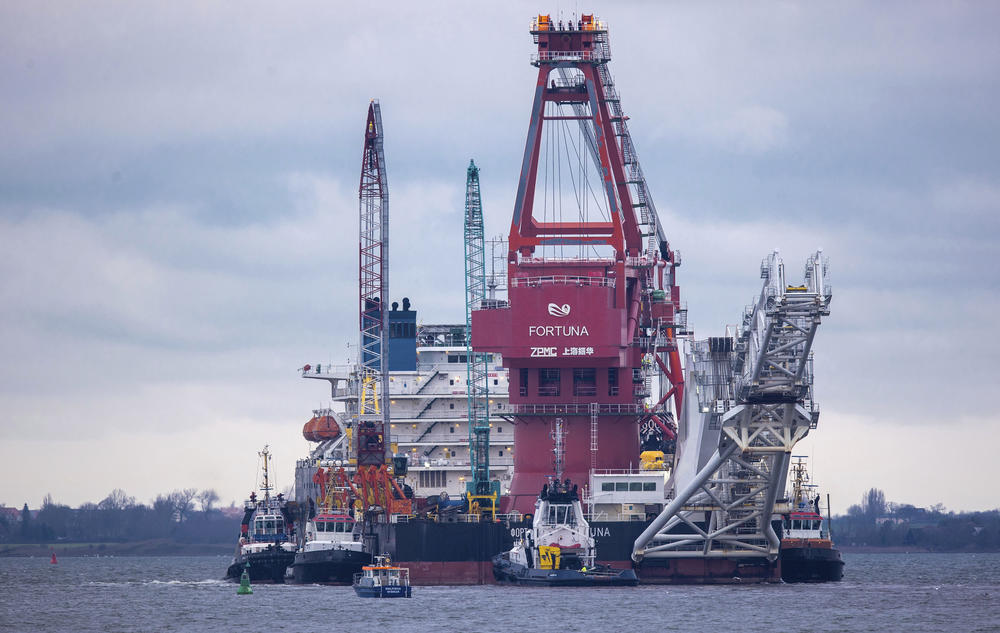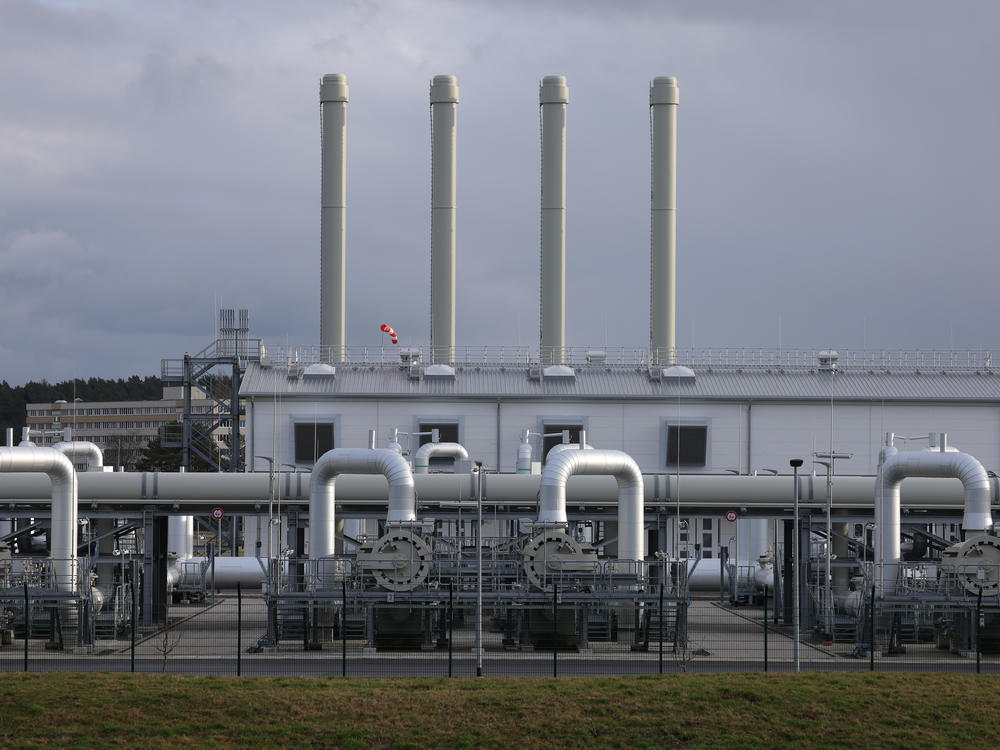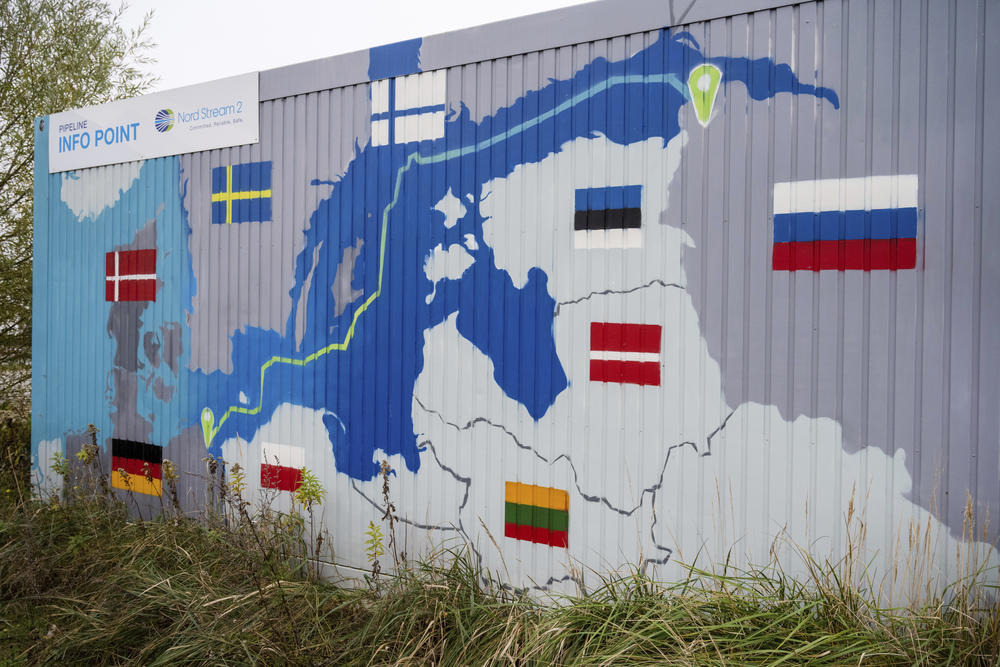Section Branding
Header Content
Explaining why natural gas plays such a big role in the Russia-Ukraine crisis
Primary Content
As the U.S. and its allies work to present a unified front to avert a Russian invasion of Ukraine, worries about Europe's energy reliance on Russia threaten to complicate the response.
As much as 40% of the continent's natural gas is supplied by Russia — prompting fears about what might happen if Moscow moves to cut off some or all of that supply.
U.S. officials have warned that Russia has nearly enough military power deployed along Ukraine's borders to stage a full-scale invasion of the country.
But even as world leaders crisscross the continent for diplomatic meetings and the U.S. and NATO move troops around Eastern Europe, the European energy piece is in the spotlight.
Read on to understand why.
Why is natural gas important to this crisis?
In short, many countries in Europe are dependent on Russia for imports of natural gas and, to a lesser extent, oil.
Foremost among them is Germany, Europe's largest economy, a key ally of the United States and a historically important participant in negotiations about Ukraine.
No country buys more natural gas from Russia than Germany, which depends on the fuel to help heat homes in winter and operate factories.
German Chancellor Olaf Scholz visited the White House this week, where talks with President Biden about a Russia-to-Germany pipeline called Nord Stream 2 were front and center. Though it is not yet functional, the pipeline has long been the focus of some debate among the U.S and its allies — Germany supports the pipeline, while in the U.S., it has been controversial due to concerns that it could increase Europe's dependence on Russian energy even more.
The Biden administration has said the U.S. will prevent Nord Stream 2 from coming online if Russia invades Ukraine. Germany has hesitated to say the same, even as it insists it is acting in lockstep with the U.S. The most Scholz has said is that "all options are on the table" if Russia invades. (The U.S. has not specified how it would block the pipeline; asked on Monday, Biden replied, "I promise you, we'll be able to do it.")
How dependent is Europe on Russian gas?
More than 38% of the natural gas used by European Union members in 2020 was imported from Russia, according to Eurostat, the EU's statistics office.
Across Europe, however, the reliance on Russian gas varies widely by country. Some buy hardly any Russian gas, like the United Kingdom, or use low amounts of natural gas altogether, like Sweden.
But others — especially in central and Eastern Europe, including states once part of the Soviet bloc — are 100% reliant, or close to it, on Russia for significant natural gas needs.
Western leaders, both in Europe and the U.S., have long urged Europe to reduce reliance on Russia in order to limit the continent's vulnerability to geopolitical plays by Russian President Vladimir Putin.
"The fact that they are dependent on Russian gas has given Vladimir Putin tremendous coercive power over Europe's economies," said retired Gen. H.R. McMaster, a former U.S. national security adviser, in an interview with NPR last month.
During an energy crisis in Europe last fall, Russia dialed back exports to Europe, helping exacerbate the low inventories and high demand that sent energy prices spiking.
"In the typical Russian fashion, they did it in a way that they couldn't be accused of breaching any of their commercial relations, but still managed to give a strong reminder to Germany, in particular, and the rest of Europe, just how dependent they were on Russian gas," says David Goldwyn, president of the Goldwyn Global Strategies energy advisory firm. "They're no fools."
Putin denied accusations that he was using gas as a political tool, but he also said that if German regulators approved the Nord Stream 2 pipeline, Russia would "begin pumping gas the next day."
What will happen to Europe if Russia shuts off the valve?
A sudden, complete cutoff of Russian gas to Europe is unlikely — but if it were to happen, experts warn it would be painful. Another option available to Russia would be to cut off gas exports via pipelines in Ukraine — a move that would notably affect Germany. (Its reliance on Ukraine-based pipelines is part of the reason for its interest in Nord Stream 2.)
With supply drastically affected, Europe's already-high energy prices would likely skyrocket.
"If we will get additional volumes from Norway and from Azerbaijan and from Qatar and from the United States, then we can build up a scenario how to handle the situation that is theoretically possible if we have full disruption of gas flows from Russia," said European Commissioner for Energy Kadri Simson, speaking at a news conference on Tuesday.
One short-term solution is importing liquefied natural gas from countries like Qatar and the U.S. The U.S. has dramatically increased its exports of LNG to Europe in recent years. But experts say that LNG supplies would likely be unable to cover all needs in the case of a complete Russian cutoff.
Quickly implementing alternatives to natural gas is a challenge. For instance, coal is not an attractive solution, given efforts by many European countries to reduce carbon emissions and tackle climate change.
What is the view from Russia on this issue?
In a sense, analysts say, now could be an opportune time for Putin to cut the lines: Russia is sitting on $630 billion in currency reserves, meaning it could potentially afford a short-term hit to revenue. Meanwhile, gas and oil prices are very high, so a cutoff would seriously hurt the coffers of European countries scrambling to cover the shortfall.
But just as Europe depends on Russia for gas, Russia also depends on Europe for revenue. Europe buys nearly three-quarters of Russia's gas.
With gas prices spiking, Russia's natural gas sales soared to more than $60 billion in 2021. The country's largest gas company, Gazprom, is majority state-owned, and revenues from sales make up a major portion of Russia's federal budget.
"It needs oil and gas revenues at least as much as Europe needs its energy supply. Two-thirds of Russia's export revenues come from oil and gas. That's about half of Russia's budget revenues. So this is far from checkmate for Putin. This is a codependency," Daleep Singh, the White House deputy national security adviser for international economics, told NPR.
A cutoff would also likely prompt Europe to fast-track alternative energy sources, says Henning Gloystein, director of energy at the Eurasia Group.
"There would be an immediate, concerted effort by the European Union to permanently reduce gas reliance on Russia, which obviously won't solve the problem this winter. But over the next two years, that would have pretty strong consequences," Gloystein says.
How does the U.S. play into all this?
The U.S. and its allies are trying to find an end to this crisis that does not involve violence in Ukraine.
One strategy Washington is exploring is to levy more sanctions on Russia — severe enough to convince Putin to pull back on the troops and military equipment he has amassed on Ukraine's borders.
Europe's energy entanglement makes that option more difficult. The Kremlin could choose to retaliate by cutting off supplies. Or, if energy sanctions are off the table and European gas money continues to flow into Moscow's coffers, the impact of other sanctions could be less effective than hoped.
As a result, helping to diversify European energy supplies has been a necessary part of the U.S. response, alongside the military moves and diplomatic efforts.
"We've been working very closely with Germany and with Europe to surge capacity from other parts of the world — from Europe, from North Africa, the Middle East and Asia — and we think we're prepared to compensate for any shortfalls that might materialize," said Singh.
Copyright 2022 NPR. To see more, visit https://www.npr.org.



